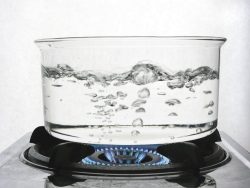 Recent findings from a study suggest that merely five minutes of boiling water could slash the concentration of microplastics in tap water by as much as 90%. Boiling tap water does more than just neutralize potential pathogens; it’s also effective in breaking down harmful pollutants like microplastics and chemicals, thereby enhancing the safety of your drinking water.
Recent findings from a study suggest that merely five minutes of boiling water could slash the concentration of microplastics in tap water by as much as 90%. Boiling tap water does more than just neutralize potential pathogens; it’s also effective in breaking down harmful pollutants like microplastics and chemicals, thereby enhancing the safety of your drinking water.
Researchers point out that the practice of boiling water for purification has deep roots in various Asian cultures, serving as a traditional method to cleanse water. This straightforward approach of boiling tap water is effective in removing nano- and microplastics, thus significantly reducing the ingestion of these particles via water. To best eliminate contaminants like polystyrene, polyethylene, and polypropylene, it’s advised to boil water using non-plastic electric kettles or on gas stoves.
In the process of boiling water with specific levels of alkalinity and hardness, insoluble mineral deposits, such as calcium carbonate, often form. The researchers behind the study proposed that during the crystallization process in hot water, calcium carbonate comes into contact with nanoplastics. As a result, the calcium carbonate surrounds the nanoplastics, leading to the formation of the flaky sediment often observed at the bottom of tea kettles.
The widespread use of plastic has led to the pervasive presence of nanoplastics and microplastics in both groundwater and surface waters worldwide. These tiny particles have infiltrated even the most remote and extreme environments. Plastic pollution dominates marine debris, revealing that in 2017 alone, over 8 million tons of plastic were dumped into the oceans. This figure is more than 33 times the amount recorded in 2015, highlighting a rapidly escalating crisis.
While the full health implications of nano- and microplastics remain unclear, emerging studies have indicated potential risks associated with their build-up in the human body. Such risks include the development of insulin resistance, disruptions in liver metabolism, DNA damage, dysfunction of various organs, complications with immune responses, neurotoxic effects, and adverse impacts on reproductive health.
Although the study concentrated on just three nanoparticle varieties, the findings offer significant benefits for public health. The researchers calculated that individuals boiling their water ingest two to five times fewer nanoplastics compared to those who don’t. This suggests that consuming boiled water could be a practical and long-lasting method to decrease worldwide nano- and microplastic exposure. This approach may even surpass the effectiveness of consuming bottled water, particularly that which is packaged in plastic. Surprisingly, a standard liter-sized plastic water bottle is estimated to contain 240,000 nanoplastic particles, amounting to 10 to 100 times more than previously believed.
To view the original scientific study click below:
Drinking Boiled Tap Water Reduces Human Intake of Nanoplastics and Microplastics





